小学六年级英语介词填空
人教版小学六年级上册英语知识点【各单元】

【导语】⼩学⽣要从⼩打好英语学习的基础,为⼤家准备了⼈教版⼩学六年级上册英语知识点【各单元】,希望对⼤家有所帮助!Unit 1 How do you go to school?⼀、重点短语:by plane 坐飞机 by ship 坐轮船 on foot步⾏ by bike 骑⾃⾏车by bus 坐公共汽车 by train 坐⽕车 traffic lights 交通灯 traffic rules交通规则go to school 去上学 get to 到达 get on上车 get off下车Stop at a red light. 红灯停 Wait at a yellow light. 黄灯等Go at a green light. 绿灯⾏⼆、重点句型:1.How do you go to school? 你怎么去上学?ually I go to school on foot. Sometimes I go by bus.通常我步⾏去上学。
有时候骑⾃⾏车去。
3.How can I get to Zhongshan Park ? 我怎么到达中⼭公园?4.You can go by the No. 15 bus. 你可以坐15路公共汽车去。
三、重点语法:1、There are many ways to go somewhere.到⼀个地⽅去有许多⽅法。
这⾥的ways⼀定要⽤复数。
因为there are是There be句型的复数形式。
2、on foot 步⾏乘坐其他交通⼯具⼤都可以⽤介词by…,但是步⾏只能⽤介词on 。
4、go to school的前⾯绝对不能加the,这⾥是固定搭配。
5、USA 和 US 都是美国的意思。
另外America也是美国的意思。
6、go to the park 前⾯⼀定要加the. 如果要去的地⽅有具体的名字,就不能再加the ,如果要去的地⽅没有具体名字,都要在前⾯加the. ( go to school除外。
小学六年级英语介词练习及答案
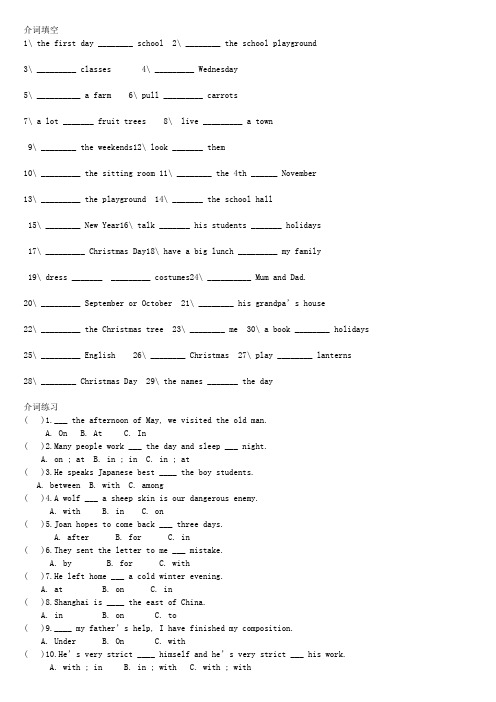
介词填空1\ the first day ________ school 2\ ________ the school playground3\ _________ classes 4\ _________ Wednesday5\ __________ a farm 6\ pull _________ carrots7\ a lot _______ fruit trees 8\ live _________ a town9\ ________ the weekends12\ look _______ them10\ _________ the sitting room 11\ ________ the 4th ______ November13\ _________ the playground 14\ _______ the school hall15\ ________ New Year16\ talk _______ his students _______ holidays17\ _________ Christmas Day18\ have a big lunch _________ my family19\ dress _______ _________ costumes24\ __________ Mum and Dad.20\ _________ September or October 21\ ________ his grandpa’s house22\ _________ the Christmas tree 23\ ________ me 30\ a book ________ holidays 25\ _________ English 26\ ________ Christmas 27\ play ________ lanterns28\ ________ Christmas Day 29\ the names _______ the day介词练习( )1.___ the afternoon of May, we visited the old man.A. OnB. AtC. In( )2.Many people work ___ the day and sleep ___ night.A. on ; atB. in ; inC. in ; at( )3.He speaks Japanese best ____ the boy students.A. betweenB. withC. among( )4.A wolf ___ a sheep skin is our dangerous enemy.A. withB. inC. on( )5.Joan hopes to come back ___ three days.A. afterB. forC. in( )6.They sent the letter to me ___ mistake.A. byB. forC. with( )7.He left home ___ a cold winter evening.A. atB. onC. in( )8.Shanghai is ____ the east of China.A. inB. onC. to( )9.____ my father’s help, I have finished my composition.A. UnderB. OnC. with( )10.He’s very strict ____ himself and he’s very strict ___ his work.A. with ; inB. in ; withC. with ; with( )11.I really can’t agree ____ you.A. toB. onC. with( )12.The shop won’t open ___ nine in the morning.A. untilB. atC. during( )13.How about ___ the flowers now?A. wateringB. are wateringC. watered( )14.She spent all his money ___ books.A. inB. withC. on( )15.They are talking ___ low voices.A. withB. inC. on( )16.It’s very kind ___ you to help us.A. forB. toC. of( )17.What will you have ___ breakfast this morning?A. withB. forC. by( )18.A plane is flying ____ the city.A. onB. overC. above( )19.You are free to speak ___ the meeting.A. atB. inC. on( )20.Mr. Green will stay in China___ Friday.A. toB. onC. till( )21.It’s wrong to play jokes ___ other people.A. onB. ofC. with( )22.Which color do you like? I prefer blue ___ red.A. forB. asC. to( )23.The student will give us a talk ___ how to use our spare time.A. forB. onC. in( )24.I paid two hundred yuan ___ that kind of bicycle.A. inB. forC. on( )25.The doctor is very kind ___ his patientsA. toB. onC. at( )26.We can’t live ___ air.A. inB. withC. without( )27.The child was afraid ___ the strange sound.A. atB. forC. of( )28.He was very angry ___ her for being late.A. forB. withC. at( )29.What do you think __ _ the play?A. aboutB. likeC. of( )30.I think it’s the right way to work out the problem, but I am not sure _____ it.A. doB. aboutC. of( )31.Reading ___ the sun isn’t good _ __ youA. under ; forB. in ; forC. in ; to( )32.I won’t ask about it, I’m going to see it ___ _ my own eyes.A. byB. forC. with( )33.We go to school every day _ ___ Sunday.A. exceptB. withoutC. on( )34.There is a small river ___ the two townsA. inB. betweenC. among( )35.Li Lei sometimes falls asleep ___ the lesson.A. forB. throughC. during( )36.Mr. Black went to Paris ___ a few days.A. forB. inC. after( )37.They will leave ________ London next month.A. toB. fromC. for( )38.Are you going to the zoo __ _ bus or ___ my car?A. on ; byB. by ; inC. on ; in( )39.He woke up several times _ __ the nightA. inB. atC. on( )40. We traveled overnight to Paris and arrived _______ 5 o’clock ______ the morning.A. on; inB. at; inC. at; onD. in; on( )41. Where’s Lily? We are all here _______ her.A. besideB. aboutC. exceptD. with( )42. She sent her friend a postcard _______ a birthday present.A. onB. asC. forD.( )43. Jack has studied Chinese in this school ______ the year of 2000.A. sinceB. inC. onD. by( )44. ---What is a writing brush, do you know?---It’s _______ writing and drawing.A. withB. toC. forD. by( )45. English is widely used ______ travellers and business people all over the world. A. to B. for C. as D. by( )46. _____ the help of my teacher, I caught up with the other students.A. UnderB. InC. WithD. On( )47. Hong Kong is ______ the south of China, and Macao is ______the west of Hong Kong.A. in; toB. to; toC. to; inD. in; in( )48. ---You’d better not go out now. It’s raining.---It doesn’t matter. My new coat can keep ______ rain.A. inB. ofC. withD. off( )49.There are many apples ___ the tree. A bird ___ the tree is picking an apple.A. in ; onB. on ; inC. in ; at( )50. “Who are you going to play ____?”“Grade Two.”A. aboutB. byC. against一、选用括号内恰当的介词填空。
最新小学六年级英语完形填空题及答案(1)

一、完形填空1.完形填空The students of Class 2 are 1 going to have any classes next week. They are going to 2 the farmers 3 their work on the farm. They're going to 4 apples. Manystudents think it's 5 better than having classes. They're going to get up 6 next Monday morning.They're going to meet outside the school gate at 7: 30. The farm is 7 near. They're going there 8 bus. They're going to 9 on their old clothes. They'regoing to work _ 10 .1. A. no B. not C. having D. always2. A. do B. help C. make D. given3. A. doing B. with C. to make D. to doing4. A. having B. picking C. pick D. have5. A. more B. much C. man D. little6. A. later B. earlier C. early D. late7. A. not B. quite C. little D. no8. A. take B. take a C. by D. on9. A. wear B. take C. put D. hardly10. A. hard B. a little C. heavy D. hardly【答案】(1) B; (2) B; (3) B; (4) C; (5) B; (6) C; (7) A; (8) C; (9) C; (1。
新人教版小学六年级英语下册介词表

新人教版小学六年级英语下册介词表一、关于介词的定义介词是一类虚词,用于表示人或物在时间、空间或逻辑关系上的位置、方向、时间等。
二、常用的英语介词1. in- 用于表示在某个时间段内,如in the morning(在早上)、in the afternoon(在下午)- 用于表示在某个季节,如in spring(在春季)、in summer (在夏季)- 用于表示在某个具体地点,如in the classroom(在教室)、in the park(在公园)2. on- 用于表示在某天或日期,如on Monday(在星期一)、on March 1st(在3月1日)- 用于表示在某个具体表面,如on the desk(在桌子上)、on the wall(在墙上)- 用于表示在某种交通工具上,如on the bus(在公交车上)、on the plane(在飞机上)3. at- 用于表示在某个具体时间,如at 3 o'clock(在3点钟)、at noon(在中午)- 用于表示在某个具体地点,如at school(在学校)、at the supermarket(在超市)- 用于表示在某种活动中,如at a party(在派对上)、at a concert(在音乐会上)4. into- 表示进入某个地方或状态,如go into the room(进入房间)、turn into a frog(变成一只青蛙)5. under- 表示在某物体下面或更低的位置,如under the table(在桌子下面)、under the bed(在床下)6. over- 表示在某个物体的上方,如over the bridge(在桥上)、over the clouds(在云上)7. through- 表示穿过某个地方或经过某个区域,如walk through the park (穿过公园)、drive through the tunnel(经过隧道)8. between- 表示在两个物体、位置或时间之间,如between the two trees (在两棵树之间)、between Monday and Wednesday(在星期一和星期三之间)9. among- 表示在三个或三个以上的物体、位置或时间之间,如among the flowers(在花中间)、among the students(在学生中间)10. behind- 表示在某个物体后面,如behind the door(在门后面)、behind the car(在车后面)11. in front of- 表示在某个物体前面,如in front of the house(在房子前面)、in front of the mirror(在镜子前面)12. next to- 表示在某个物体旁边,如next to the tree(在树旁边)、nextto the bookcase(在书架旁边)13. between- 表示在两个物体之间,如between the two houses(在两个房子之间)14. among- 表示在三个或三个以上的物体之间,如among the students(在学生之间)15. with- 表示伴随,如go to the park with my friend(和我的朋友一起去公园)16. without- 表示没有某物或某人,如eat lunch without vegetables(没有蔬菜的午餐)、go to the shop without money(没有钱去商店)17. for- 表示对某人或某物的利益或目的,如buy a gift for Mom(给妈妈买一份礼物)、study hard for the exam(为了考试而努力研究)三、使用介词的注意事项- 介词通常位于名词或代词之后,形成介词短语。
人教PEP版小学英语六年级下册期末复习用单词的正确形式填空专题练习3

人教PEP版小学英语六年级下册期末复习用单词的正确形式填空专题练习附答案解析1.—______ you ______ (visit) your grandparents yesterday? —No, I ______.2.—What _____ you _____ (do) tomorrow?—I _____ (play) football.3.Su Ling is getting ______ (tall) than before.4.My grandfather and I ______ (watch) TV last night.5.Ben is ______ (fat) than his friend Mike.6.Summer is much ______ (hot) than spring.7.My mother usually ______ (do) the cleaning on Sundays. But last week she ______ (do) it on Saturday.8.—_____ you _____ (watch) TV tomorrow evening?—Yes, I _____.9.There _____ (be) a sports meet next Friday.10.My mother _____ (study) English next week.11.Thank you for _______ (stay) in our hotel.12.—Did Mike _______ (buy) gifts for us?—No, he _______ (do).13.I often _______(do) my homework in the evening. But yesterday evening I _______ (watch) TV.14.I’m going to _______ (visit) the moon one day.15.Now I love to _______ (swim) in summer.16.My mother often _______ (go) to the supermarket on weekends.17.There ______ (be) no gym in my school 3 years ago, but now there ______ (be) a new one.18.—What ______ (do) you do last weekend?—I ______ (go) fishing with my parents.19.—Does your pen pal ______ (live) in China?—No, he ______ (live) in Australia.20.I ________ (don’t) like PE before.21.Alice is ________ (short) than her sister.22.He couldn’t ________ (ride) his bike well before.23.There ________ (be) some tall trees in my school two years ago. 24.My father ________ (play) badminton last night.25.Mr Lee ________ (take) a trip last month.26.How about _____ (go) cycling with me this weekend? 27.There _____ (be) no buildings in my old school.28.Da Ming usually _____ TV on Fridays. But he _____ his clothes last Friday.29.Yesterday I _____ (stay) at home and _____ (watch)TV. 30.The ______ (America) ______ (take) about five days to get to the moon in 1969.31.He ______ (go) cycling with his friend yesterday.32.She ______ (can not) ice-skate last year, but now she can.33.She often ______ (watch) TV on Sunday.34.Look at Chen Jie's ______ (photo).35.There ______ (be) a big apple tree in her garden now. 36.There was no Internet in ______ (he) time.37.There ______ (be) no computers in my school in 1980. 38.There ______ (be) only a small bridge over the river ten years ago. 39.There ______ (be) many birds in the forest now.40.The music ______ (be) too loud. So my mum didn’t ______ (sleep) last night.41.—Did Mary ______ (wash) her clothes the day before yesterday? —No, she ______ (do not). She ______ (see) a film.42.I ______ (stay) at home last Sunday. Because I ______ (have) a cold.43.—What ______ (do) you do last weekend?—I ______ (clean) my room and ______ (watch) TV.44.They ________ in the countryside before. Now, they ________ in the city. (live)45.He often ________ breakfast at 7:00. Yesterday he ________ breakfast at 6:45. (have)参考答案及解析1.Did visit didn't详解:句意:—你昨天去看望你的爷爷奶奶了吗?—不,我没去。
小学六年级英语语法:介词短语的运用
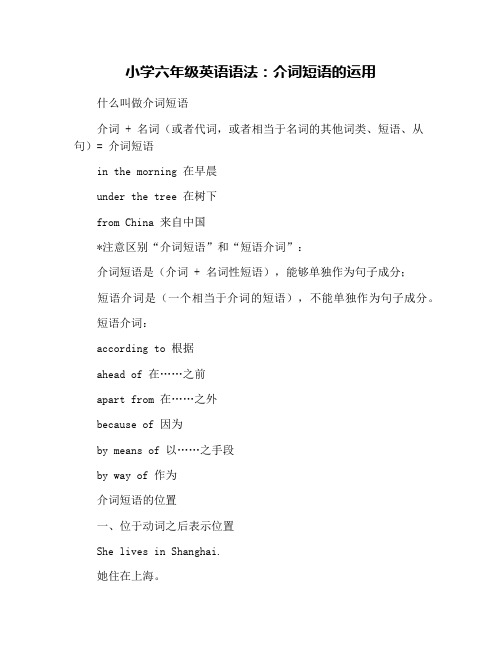
小学六年级英语语法:介词短语的运用什么叫做介词短语
介词 + 名词(或者代词,或者相当于名词的其他词类、短语、从句)= 介词短语
in the morning 在早晨
under the tree 在树下
from China 来自中国
*注意区别“介词短语”和“短语介词”:
介词短语是(介词 + 名词性短语),能够单独作为句子成分;
短语介词是(一个相当于介词的短语),不能单独作为句子成分。
短语介词:
according to 根据
ahead of 在……之前
apart from 在……之外
because of 因为
by means of 以……之手段
by way of 作为
介词短语的位置
一、位于动词之后表示位置
She lives in Shanghai.
她住在上海。
The children are playing in the street now.现在孩子们在街上玩。
二、位于动词之后表示方向
He went into the kitchen.
他到厨房里去。
三、位于句首表示突出、对照
In the garden everything was so beautiful.花园里一切都是那么美丽。
四、位于句首,倒装主谓
Behind me lay the fields.
在我的后面是一片田野。
On the desk is a bag.
桌子上有一个袋子。
五、位于名词之后,用于限制前面的名词
The apple on the plate is for you.
盘子上的苹果是给你的。
小学六年级英语汇总(介词)
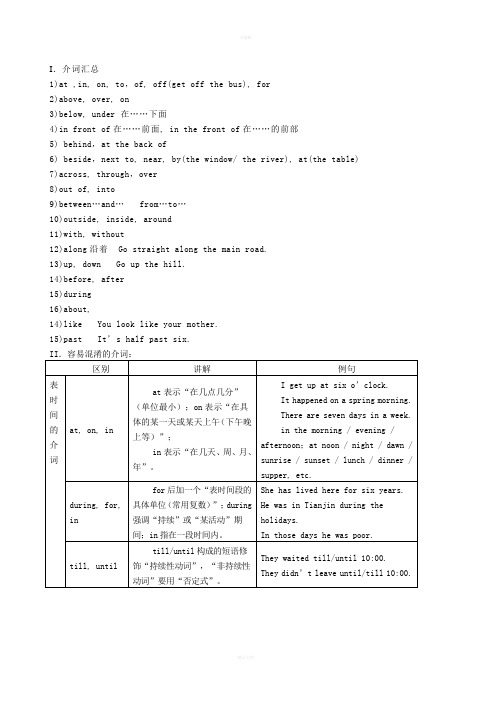
I.介词汇总1)at ,in, on, to,of, off(get off the bus), for2)above, over, on3)below, under 在……下面4)in front of在……前面, in the front of在……的前部5) behind,at the back of6) beside,next to, near, by(the window/ the river), at(the table)7)across, through,over8)out of, into9)between…and… from…to…10)outside, inside, around11)with, without12)along沿着 Go straight along the main road.13)up, down Go up the hill.14)before, after15)during16)about,14)like You look like your mother.15)past It’s half past si x.1.表示地点位置的介词1)at ,in, on, to,forat (1)表示在小地方; (2)表示“在……附近,旁边”in (1)表示在大地方; (2)表示“在…范围之内”。
on 表示毗邻,接壤,“在……上面”。
to 表示在……范围外,不强调是否接壤;或“到……”2)above, over, on 在……上above 指在……上方,不强调是否垂直,与 below相对;over指垂直的上方,与under相对,但over与物体有一定的空间,不直接接触。
on表示某物体上面并与之接触。
The bird is flying above my head.There is a bridge over the river.He put his watch on the desk.3)below, under 在……下面under表示在…正下方below表示在……下,不一定在正下方There is a cat under the table.Please write your name below the line.4)in front [frant]of, in the front of在……前面in front of…意思是“在……前面”,指甲物在乙物之前,两者互不包括;其反义词是behind (在……的后面)。
小学六年级重点英语单词

小学六年级重点英语单词一、动词(Verbs)1. study(学习)- I study English every day.2. play(玩耍)- We often play soccer in the park.3. do(做,干)- What do you do in your free time?4. go(去)- They go to school by bus.5. like(喜欢)- She likes to read books.二、名词(Nouns)1. book(书)- Can I borrow a book from the library?2. school(学校)- My sister goes to school on weekdays.3. friend(朋友)- I have many friends at school.4. family(家庭)- I live with my family in a big house.5. teacher(老师)- Our English teacher is very kind.三、形容词(Adjectives)1. happy(快乐的)- We are all very happy to see you.2. small(小的)- He has a small dog as a pet.3. big(大的)- Their apartment is big and spacious.4. tall(高的)- The basketball player is very tall.5. smart(聪明的)- Lily is a very smart student.四、副词(Adverbs)1. always(总是)- She is always late for class.2. carefully(仔细地)- Please read the instructions carefully.3. quickly(快速地)- The rabbit runs quickly in the forest.4. well(好地)- He plays the piano very well.5. loudly(大声地)- The children are laughing loudly.五、介词(Prepositions)1. in(在……里面)- The cat is sleeping in the box.2. on(在……上面)- There is a book on the table.3. at(在……处)- I will meet you at the park later.4. with(和……一起)- She goes to the movies with her friends.5. for(为了)- They bought a cake for their teacher's birthday.六、冠词(Articles)1. a(一个,一)- I saw a beautiful flower in the garden.2. an(一个,一)- An elephant is a big animal.3. the(定冠词)- The sun rises in the east every morning.七、代词(Pronouns)1. I(我)- I love to eat ice cream.2. you(你)- Do you want to play with me?3. he(他)- He is my best friend.4. she(她)- She has a beautiful smile.5. they(他们)- They are going to the beach tomorrow.八、颜色(Colors)1. red(红色)- My favorite color is red.2. blue(蓝色)- The sky is blue on a sunny day.3. green(绿色)- The grass is always green in the park.4. yellow(黄色)- The sunflower is yellow and bright.5. pink(粉色)- She has a pink dress for the party.九、数字(Numbers)1. one(一)- There is only one apple left.2. two(二)- I have two cats as pets.3. three(三)- The dog has three puppies.4. four(四)- We need four chairs for the guests.5. five(五)- There are five birds in the tree.十、时间(Time)1. morning(早上)- We have English class in the morning.2. afternoon(下午)- I usually play soccer with my friends in the afternoon.3. evening(晚上)- They have dinner together every evening.4. night(夜晚)- The stars shine brightly at night.5. weekend(周末)- I love weekends because there is no school.十一、地点(Places)1. home(家)- I feel happy when I am at home.2. park(公园)- We often go for a walk in the park.3. library(图书馆)- I can borrow books from the library.4. zoo(动物园)- I visited the zoo and saw many animals.5. museum(博物馆)- We learned a lot from the museum exhibit.十二、食物(Foods)1. apple(苹果)- An apple a day keeps the doctor away.2. banana(香蕉)- My sister likes to eat bananas.3. rice(米饭)- Rice is a staple food in our country.4. bread(面包)- I eat bread for breakfast every morning.5. cake(蛋糕)- We had a delicious cake for dessert.十三、动物(Animals)1. cat(猫)- The cat is lying on the sofa.2. dog(狗)- My dog is very loyal to me.3. fish(鱼)- There are many fish in the aquarium.4. bird(鸟)- The bird is singing in the tree.5. elephant(大象)- Elephants are the largest land mammals.十四、职业(Jobs)1. doctor(医生)- My uncle is a doctor.2. teacher(老师)- She wants to be a teacher when she grows up.3. engineer(工程师)- My father is an engineer.4. nurse(护士)- Nurses take care of patients in the hospital.5. pilot(飞行员)- He dreams of becoming a pilot.十五、交通工具(Transportation)1. car(汽车)- We went for a drive in the countryside.2. bus(公交车)- I take the bus to school every day.3. train(火车)- We traveled by train to visit our grandparents.4. airplane(飞机)- They are going on vacation by airplane.5. bicycle(自行车)- Riding a bicycle is a great form of exercise.十六、天气(Weather)1. sunny(晴朗的)- It's a sunny day, perfect for a picnic.2. cloudy(多云的)- The sky is cloudy, it might rain later.3. rainy(下雨的)- Don't forget to bring an umbrella, it's rainy today.4. windy(有风的)- The wind is blowing strongly, be careful.5. snowy(下雪的)- It's snowy outside, let's build a snowman.十七、身体部位(Body Parts)1. head(头)- I hit my head on the door.2. eyes(眼睛)- She has beautiful blue eyes.3. ears(耳朵)- My ears are sensitive to loud noises.4. nose(鼻子)- I have a runny nose.5. mouth(嘴巴)- She has a cute smile with dimples on her cheeks.十八、衣物(Clothing)1. shirt(衬衫)- He wears a white shirt to work.2. pants(裤子)- These pants are too tight for me.3. dress(裙子)- She looks beautiful in that dress.4. shoes(鞋子)- I need a new pair of shoes.5. hat(帽子)- He wears a hat to protect himself from the sun.十九、季节(Seasons)1. spring(春天)- Spring is the season of renewal.2. summer(夏天)- Summer is the hottest season of the year.3. autumn(秋天)- Autumn is the season of harvest.4. winter(冬天)- Winter is the coldest season of the year.5. season(季节)- Each season has its own beauty.二十、日常用品(Daily Necessities)1. pen(钢笔)- I lost my pen, can I borrow yours?2. pencil(铅笔)- I need a sharpener for my pencil.3. ruler(尺子)- The ruler is made of plastic.4. eraser(橡皮)- I made a mistake, I need an eraser.5. backpack(背包)- My backpack is heavy because it's full of books.。
人教版小学六年级英语完形填空题及答案详细解析
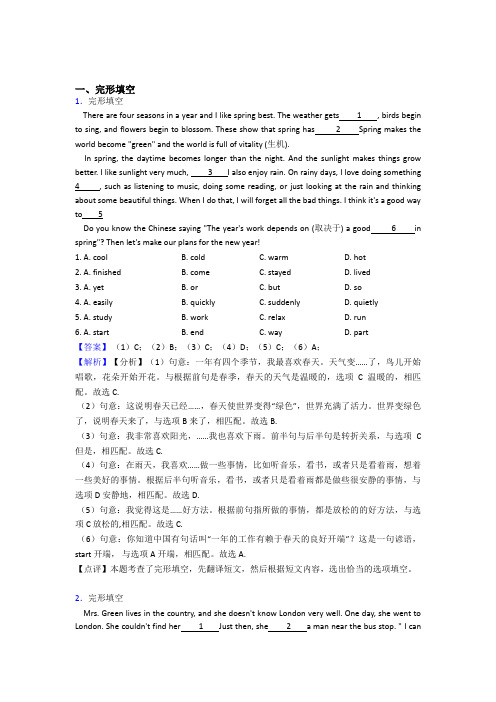
一、完形填空1.完形填空There are four seasons in a year and I like spring best. The weather gets 1 , birds beginto sing, and flowers begin to blossom. These show that spring has 2 Spring makes the world become "green" and the world is full of vitality (生机).In spring, the daytime becomes longer than the night. And the sunlight makes things grow better. I like sunlight very much, 3 I also enjoy rain. On rainy days, I love doing something 4 , such as listening to music, doing some reading, or just looking at the rain and thinking about some beautiful things. When I do that, I will forget all the bad things. I think it's a good wayto 5Do you know the Chinese saying "The year's work depends on (取决于) a good 6 in spring"? Then let's make our plans for the new year!1. A. cool B. cold C. warm D. hot2. A. finished B. come C. stayed D. lived3. A. yet B. or C. but D. so4. A. easily B. quickly C. suddenly D. quietly5. A. study B. work C. relax D. run6. A. start B. end C. way D. part【答案】(1)C;(2)B;(3)C;(4)D;(5)C;(6)A;【解析】【分析】(1)句意:一年有四个季节,我最喜欢春天。
小学六年级英语用适当的介词填空

用适当的介词填空●The man blue is Jack’s father.●Who’ the girl small mouth?●You shouldn’t walk the grass.●Look, Nancy is sitting her father and mother.●You must stay away the house.●Now, I know a lot insects.●My little brother always has a lot questions.●We’re very happy school.●Keep the grass,please.●Jim is in Row 4.I sit him●Let’s hurry, we’re late the class.●Liu Tao is passing the ball David.●Who’s the woman the red scarf?●Our classroom is the teachers’office●Look the picture. Who is the girl the man and the woman.●Can you read the number one ten?●Go the street,turn right at the first crossing.●What can you see the tree? Some peaches●Mr Wang is ill. He’s home●Here’s a letter Fang Ming. Let me read it to you.●My skirts are the sofa●This is a photo my family●Can I go you?●The girl green is my aunt.●There are some bikes the big tree.●Put your umbrella the door.●The post office is the bank of China●I can see a sofa the desk and the fridge.。
小学六年级英语介词知识点及练习题
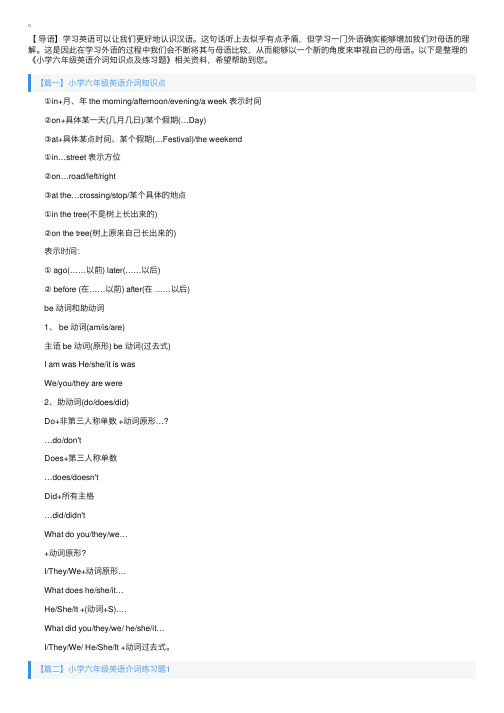
【导语】学习英语可以让我们更好地认识汉语。
这句话听上去似乎有点⽭盾,但学习⼀门外语确实能够增加我们对母语的理解。
这是因此在学习外语的过程中我们会不断将其与母语⽐较,从⽽能够以⼀个新的⾓度来审视⾃⼰的母语。
以下是整理的《⼩学六年级英语介词知识点及练习题》相关资料,希望帮助到您。
【篇⼀】⼩学六年级英语介词知识点 ①in+⽉、年 the morning/afternoon/evening/a week 表⽰时间 ②on+具体某⼀天(⼏⽉⼏⽇)/某个假期(…Day) ③at+具体某点时间、某个假期(…Festival)/the weekend ①in…street 表⽰⽅位 ②on…road/left/right ③at the…crossing/stop/某个具体的地点 ①in the tree(不是树上长出来的) ②on the tree(树上原来⾃⼰长出来的) 表⽰时间: ① ago(……以前) later(……以后) ② before (在……以前) after(在 ……以后) be 动词和助动词 1、 be 动词(am/is/are) 主语 be 动词(原形) be 动词(过去式) I am was He/she/it is was We/you/they are were 2、助动词(do/does/did) Do+⾮第三⼈称单数 +动词原形…? …do/don't Does+第三⼈称单数 …does/doesn't Did+所有主格 …did/didn't What do you/they/we… +动词原形? I/They/We+动词原形… What does he/she/it… He/She/It +(动词+S)…. What did you/they/we/ he/she/it… I/They/We/ He/She/It +动词过去式。
【篇⼆】⼩学六年级英语介词练习题1 ( ) 1. Why did you get up so early ___ this morning.A. onB. /C. atD. in ( ) 2. He went to Shanghai___ September 3, 1991 and came back___ a cold morning last year.A. in; onB. on; inC. on; onD. in; ia ( ) 3. Lucy was born____ the night of May 12, 1984.A. onB. inC. atD. to ( ) 4. Mrs Brown came to China ____ 1996.A.onB. ofC. toD. in ( ) 5 ___ the morning of November 20, 1915, the workers came to Chicago to show their mourning of Joe Hill.A. OnB. InC. OnD. At ( ) 6. Ann moved___Hangzhou___September, 1992.A. /; inB. to; inC. to; on D, in; in ( ) 7. They started off___an autumn afternoon.A. duringB. atC. inD. on ( ) 8. He often goes ____ school ____ six thirty ____ the morning.A. for; to; inB. to; at; inC. to; for; at D, for; at; to ( ) 9. He arrived ___ Shanghai ___ 9: 30 ___ March 5.A. at; in; atB. to; on; atC. in; on; atD. in; at; on ( ) 10.The English teacher told me to get there____ half past ten.A. inB. atC. onD. of 参考答案: B C A D B A D B D B【篇三】⼩学六年级英语介词练习题2 ( ) 1. Children get gifts ____ Christmas and ____ their birthdays.A. on; onB. at; onC. in; inD. in; on ( ) 2.----There is nothing ____tomorrow afternoon, is there? -----No. We can have a game of table tennis.A. onB. inC. outD. up ( ) 3. A lot of students in our school were born____March, 1981.A. inB. atC. onD. since ( ) 4. He suddenly returned____ a rainy night.A. onB. atC. inD. during ( ) 5. My grandfather was born____Oct. 10, 1935.A. onB. inC. atD. of ( ) 6. The train is starting___five minutes.A. inB. atC. forD.still ( ) 7. Mike does his exercises ____ seven _____ the evening.A. on; toB. at; inC. by; ofD. at; on ( ) 8. Children wake up very early____the morning of Christmas Day.A. inB. onC. forD. at ( ) 9 ____ a cold winter morning, I met her in the stfeet.A. InB. OnC. AtD. For ( ) 10 It happened to be very cold____ the morning of our sports meeting.A. atB. onC. withD. of 参考答案:B A A A A A B B B B。
陕旅版小学六年级英语总复习介词
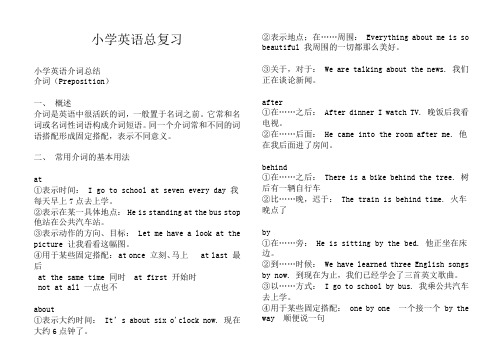
小学英语总复习小学英语介词总结介词(Preposition)一、概述介词是英语中很活跃的词,一般置于名词之前。
它常和名词或名词性词语构成介词短语。
同一个介词常和不同的词语搭配形成固定搭配,表示不同意义。
二、常用介词的基本用法at①表示时间: I go to school at seven every day 我每天早上7点去上学。
②表示在某一具体地点: He is standing at the bus stop 他站在公共汽车站。
③表示动作的方向、目标: Let me have a look at the picture 让我看看这幅图。
④用于某些固定搭配: at once 立刻、马上 at last 最后at the same time 同时 at first 开始时not at all 一点也不about ①表示大约时间:It’s about six o'clock now. 现在大约6点钟了。
②表示地点;在……周围: Everything about me is so beautiful 我周围的一切都那么美好。
③关于,对于: We are talking about the news. 我们正在谈论新闻。
after①在……之后: After dinner I watch TV. 晚饭后我看电视。
②在……后面: He came into the room after me. 他在我后面进了房间。
behind①在……之后: There is a bike behind the tree. 树后有一辆自行车②比……晚,迟于: The train is behind time. 火车晚点了by①在……旁: He is sitting by the bed. 他正坐在床边。
②到……时候: We have learned three English songs by now. 到现在为止,我们已经学会了三首英文歌曲。
小学六年级英语介词用法及练习

介词用法及练习1、早、午、晚要用in例:in the morning 在早上in the afternoon 在下午in the evening 在晚上in the day 在白天2、at黎明、午、夜、点与分例: at dawn, at daybreak 在黎明时候at noon 在中午at night 在夜间at midnight 在午夜以上短语都不用冠词at six o'clock 在6点钟at 7:30 (seven thirty) 在7点半at half past eleven 在11点半at nine fifteen 在9点15分at ten thirty a.m. 在上午10点30分也可以写成seven to five 5点差7分(半小时以上) five minutes after two 2点过5分at a quarter to two 1点45分at the weekend 在周末3、年、月、年月、季节、周即在"来年",在"某月",在"某年某月",在四季,在第几周等都要用in。
在某年某月某日则用on例;in 1986 在1986年in 1927 在1927年in April 在四月in March 在三月in December 1986 1986年12月in July l983 1983年7月in spring 在春季in summer 在夏季in autumn 在秋季in winter 在冬季in the fist week of this semester 这学期的第一周in the third week 在第三周以及:in the bright sunlight 在明亮的阳光下 a merchant in disguise 乔装的商人the woman in white (black, red, yellow) 穿着白(黑、红、黄)色衣服的妇女in uniform 穿着制服in mourning 穿着丧服in brown shoes 穿着棕色鞋in his shirt sleeves 穿着衬衫5、将来时态in...以后after... (从过去开始)例: They will come back in 10 days. 他们将10天以后回来。
小学六年级介词的常见用法归纳与解析

小学六年级介词的常见用法归纳与解析介词是英语中一种非常重要且常用的词类,它用来连接名词、代词、动词、形容词和副词等,起到表示位置、方向、时间、原因等等的作用。
在小学六年级的学习中,理解和正确运用介词是非常关键的。
本文将介绍小学六年级常见的介词用法以及对其进行分析和解析。
一、表示位置和方向的介词1. in介词"in"表示在某个范围、区域内,常用来指示地点或位置。
例如:in the classroom(在教室里)、in the park(在公园里)2. on介词"on"用来表示在某个表面或较大的平面上。
例如:on the table(在桌子上)、on the floor(在地板上)3. at介词"at"用来表示确切的位置或地点,通常用在某个建筑物或公共场所名称之后。
例如:at the bus stop(在公交车站)、at the library(在图书馆)4. into介词"into"表示进入某个地点或物体。
例如:jump into the water(跳进水中)、walk into the house(走进房子)5. out of介词"out of"表示从某个地方或物体出来。
例如:get out of the car(从车里出来)、take the book out of the bag (把书从包里拿出来)二、表示时间的介词1. at介词"at"用来指示具体的时间点。
例如:at 7 o'clock(在7点钟)、at noon(在中午)2. on介词"on"用来指示具体的日期或星期几。
例如:on Monday(在星期一)、on May 1st(在5月1日)3. in介词"in"用来指示一个时间段或某个月、季节、年代。
例如:in the morning(在早上)、in winter(在冬天)三、表示原因和目的的介词1. for介词"for"表示为了某个目的或原因。
牛津译林版六年级上册《单元1The Kings new clothes》小学英语-有答案-同步练习卷

牛津译林版(三起)六年级上册《Unit 1 The King's newclothes》同步练习卷(1)一、短语翻译.1. 皇帝的新装________2. 很久以前________3. 一天________.4. 讲故事________.5. 照顾________.6. 聪明人________7. 走过这个城市________8. 在街上________9. 一个小男孩________10. 指着________.二、介词填空.介词填空We can make new clothes________you.介词填空Please try________these magic clothes.介词填空The king walked________the city________his new clothes.介词填空There were a lot of people________ the street.介词填空A little boy pointed________the king.介词填空They looked________the king and shouted.三、用所给单词的适当形式填空.________ your father________ (go) to work every day last year?There________ a telephone call for you just now.(be)There________ not enough people to pick apples that day.(be)There________ any hospitals (医院) in my hometown (家乡) in 1940.(be not) We always________ to school on foot.(go)用正确时态填空Tom, with his classmates, often________footaball after school.(play)四、句子翻译.很久以前,有一个国王.他喜欢新衣服.________,there________a king. He________new________.国王什么衣服也没穿.The king isn't________ clothes.一天,两个男人拜访了国王.One day, two________ the king.愚蠢的人看不见它们.________ can't see________.大街上有许多人.(过去时)There________ a lot of________ in the________.五、阅读理解.Most English people have three names: a first name, a middle name and the family name. Their family name comes last. For example, my full name is Jim Allan Green. Green is my family name. My parents gave me both of my other names.People don't use their middle names very much. So "John Henry Brown" is usually called "John Brown". People never use Mr, Mrs or Miss before their first names. So you can say John Brown, or Mr Brown; but you should never say Mr John. They use Mr, Mrs or Miss with the family name but never with the first name.Sometimes people ask me about my name. "When you were born, why did they call you Jim? " they ask. "Why did they choose that name? " The answer is they didn't callJim. They called me James. James was the name of my grandfather. In England, people usually call me Jim for short. That's because it is shorter and easier than James.(1)Most English people have________ names.A. oneB. twoC. threeD. four.(2)________ is Jim's family name.A. JimB. GreenC. AllanD. James.(3)English people use Mr, Mrs or Miss with________.A. the family nameB. the first nameC. The middle nameD. the first name and the middle name.(4)The teacher's name is Mary Joan Shute. Her students call her________.A. miss Mary B. Miss JoanC. Miss Mary JoanD. Miss Shute.(5)People usually call the writer Jim instead of James because________.A. It's the name of his grandfatherB. It's easier for people to call himC. It's the name that his parents chose for himD. It's more difficult than James.参考答案与试题解析牛津译林版(三起)六年级上册《Unit 1 The King's newclothes》同步练习卷(1)一、短语翻译.1.【答案】theEmperor'snewclothes【考点】翻译能力【解析】the Emperor's new clothes【解答】该题考查短语翻译.皇帝用emperor,表示某某的用所有格形式,新装用New Clothes.故答案为: the Emperor's new clothes.2.【答案】long timg ago【考点】翻译能力【解析】long time ago【解答】考查短语翻译.很久之前译为:long time ago.故答案为:long time ago.3.【答案】one day【考点】翻译能力【解析】一天.【解答】答案:one day.考查短语翻译,"一天"在英语中翻译成"one day"或者"a day".4.【答案】tell a story【考点】翻译能力Family【解析】讲故事tell a story.【解答】该题考查短语翻译.讲tell,故事story.故填:tell a story.5.【答案】take care of【考点】翻译能力【解析】照顾take care of.【解答】答案:take care of.该题考查短语翻译."照顾"为固定短语,译为:take care of.故填:take care of.6.【答案】clever people【考点】翻译能力【解析】clever people【解答】考查短语翻译.聪明人译为:clever people.故答案为:clever people.7.【答案】walk through this city【考点】翻译能力【解析】walk through this city【解答】考查短语翻译.走过walk through,这个城市this city.故答案为:walk throught this city.8.【答案】in the street【考点】翻译能力【解析】in the street【解答】考查短语翻译.在街上译为:in the street.故答案为:in the street.9.a little boy【考点】翻译能力【解析】a little boy.【解答】考查短语翻译."小的"译为:little,形容词修饰名词,放在名词之前."男孩"译为:boy."一个"译为:a,放在以辅音音素开头的单词前.因而"一个小男孩"译为:a little boy.故答案为:a little boy.10.【答案】point at【考点】翻译能力Places and activities: Seeing the doctor【解析】指着point at.【解答】答案:point at.该题考查短语翻译."指着"为固定短语,point at.故填:point at.二、介词填空.【答案】for【考点】完成句子【解析】我们可以为你做新衣服.【解答】本题考查完成句子.根据题干:句子考查make sth for sb表示为某人做….空格缺少介词for.故答案为:for.【答案】on【考点】完成句子【解析】请穿上这些神奇的衣服.【解答】考查完成句子.try on试穿,是固定搭配,缺少介词on,符合句意.故填:on.【答案】through,in完成句子【解析】国王穿着新衣服在城里穿行.【解答】本题考查完成句子.根据题干:walk through表示步行穿过,in his new clothes表示穿着新衣服.均为介词的固定用法.故答案为:through,in.【答案】in【考点】完成句子【解析】街上有很多人.【解答】本题考查完成句子.根据题干:句子考查in the street表示在街道上,空格缺少介词in.故答案为:in.【答案】at【考点】完成句子【解析】一个小男孩指着国王.【解答】本题考查完成句子.根据题干:句子考查短语point at表示"指着".故答案为:at.【答案】at【考点】完成句子【解析】他们看着国王大喊大叫.【解答】本题考查完成句子.根据题干:句子考查短语look at表示"看",缺少介词at.故答案为:at.三、用所给单词的适当形式填空.【答案】Did,go【考点】单词、词组【解析】你爸爸去年每天都上班吗?【解答】本题考查单词填空.从 last year判断句子使用一般过去时,go是一个实意动词,一般疑问句需要加助动词did,后面跟动词原形.故填Did go.【答案】was【考点】单词、词组【解析】刚才有你的一个电话.【解答】本题主要考查单词填空.just now说明句子时态是一般过去时,句子主语为a telephone call,是单数形式,所以be动词用was.故填:was.【答案】were【考点】单词、词组【解析】那天没有太多的人来摘苹果.【解答】本题主要考查单词填空.that day意思:那天,说明事情已经发生,句子时态是一般过去时,not说明句子是否定句,there说明句子是there be句型.people是句子主语,表达复数概念,所以be动词用were.故填:were.【答案】weren't【考点】单词、词组【解析】在1940年的时候,我家乡没有任何医院.【解答】本题主要考查单词填空.in 1940说明句子是一般过去时.be动词用was或者were.be not说明句子是否定句,there说明句子是there be句型,hospitals是hospital的复数形式,所以be动词用were,were not可以缩写为weren't.故填:weren't.【答案】go【考点】单词、词组【解析】我们总是步行上学.【解答】考查单词填空.根据always可知,一般现在时,主语we是复数,谓语动词用原形go.故答案为:go.【答案】plays【考点】单词、词组【解析】Tom经常和他的同班同学放学后踢足球.【解答】本题主要考查单词填空.由often可知,句子时态是一般现在时.句子主语是Tom,是第三人称,with his classmates不属于主语成分,只是插入语,根据主谓一致原则,其后动词用第三人称单数形式,即:play变为plays.故填:plays.四、句子翻译.【答案】Longlongago,was,liked,clothes【考点】汉译英【解析】Long long ago,there was a king.He liked new clothes.【解答】该题考查汉译英.将题干进行英汉对比,可知空格处填"很久以前""喜欢""衣服"的英文表达以及there be结构中的系动词."很久以前"long long ago;"喜欢"like;"衣服"clothes;该句为一般过去时态,用动词过去式liked;在there be 句型中,主语a king 是单数,be 动词用was.故答案为:Long long ago;was;liked;clothes.【答案】wearing any【考点】汉译英【解析】The king isn't wearing any clothes【解答】考查汉译英.穿wear.将题干进行英汉对比,谓语是isn't+wearing.此句是否定句,any用语否定句中表示"什么也没"故答案为:wearing any.【答案】men visited【考点】汉译英【解析】One day, two men visited the king.【解答】考查汉译英.男人man,拜访visit.将题干进行英汉对比,"两个男人"的英语表达是"two men","拜访了"表示动作发生在过去,要用visited.故答案为:men visited.【答案】Stupid people,them【考点】汉译英【解析】Stupid people can't see them.【解答】考查汉译英.愚蠢的人stupid people ,它们them.根据所给中文"愚蠢的人看不见它们"可推,这是一个主语+谓语+宾语的简单句.愚蠢的人Stupid people 作主语,故首字母大写,"它们"作宾语,故用宾格them.故答案为:Stupid people ,them.【答案】were,people,street【考点】汉译英【解析】There were a lot of people in the street.【解答】考查汉译英.人people,街道street;people表复数的集体名词,a lot of people许多人;There be句型中be动词是跟后面的主语变的,a lot of people是复数作主语,按要求选用be动词的过去式were.故答案为:were,people,street.五、阅读理解.【答案】CBADB【考点】文中细节【解析】大多数英国人有三个名字:首要名字,一个中间名以及姓氏.他们的姓位于最后.例如,我的全名是Jim Allan Green.Green是我的姓.我的父母给我起了另外两部分名字.人们不太使用他们的中间名.因此"John Henry Brown"通常被称为"John Brown".人们从不使用"先生"、"夫人"以及"小姐"这样的称呼在他们首要名字前.所以你可以称呼John Brown或者Brown先生;但是你绝不应该说John先生.他们使用将"先生"、"夫人"以及"小姐"和姓一起使用而从不和首要名字一起.有时人们问我关于我的名字."当你出生时,为什么他们叫你Jim?"他们问."为什么他们选择那个名字?"答案是他们没有称呼Jim.他们叫我James.James是我祖父的名字.在英国,人们通常简略称呼我为Jim.那时因为它比James更短且更简单.【解答】(1)C.由文中Most English people have three names可知大多数英国人有三个名字.故选:C.(2)B.由文中my full name is Jim Allan Green.Green is my family name.可知Green是Jim的姓.故选:B.(3)A.由文中They use Mr,Mrs or Miss with the family name but never with the first name.可知Mr、Mrs、Miss是和姓一起使用.故选:A.(4)D.由文中Their family name comes last.以及They use Mr,Mrs or Miss with the family name but never with the first name.可知英国人姓位于最后,且Mr、Mrs、Miss 是和姓一起使用.故选:D.(5)B.由文中because it is shorter and easier than James.可知是因为Jim使用起来更简便.故选:B.试卷第11页,总11页。
人教版小学六年级英语上册填空题大全

人教版小学六年级英语上册填空题大全Unit 11. 选择正确的单词填空1. Tom can swim, but he ________ (can/can't) dive.2. My sister ________ (like/don't like) playing basketball.3. We ________ (are/is) going to have a party next Saturday.2. 根据句意填空1. Lucy ________ (is/am/are) my best friend. We often play together.2. The cat is under the table. It ________ (is/am/are) sleeping.3. Nancy ________ (like/likes) dancing. She is very good at it.Unit 21. 选择合适的词填空1. My brother is ten years old. He ________ (is/am/are) in Grade 4.3. The dog ________ (is/am/are) barking at the cat.2. 根据句意填空1. I ________ (do/does) homework every day after school.2. They ________ (is/am/are) going to the park this Sunday.3. Tom and his sister ________ (is/are) going to the zoo.Unit 31. 选择正确的单词填空1. Helen and I ________ (don't/doesn't) like playing soccer.2. He ________ (is/am) good at swimming. He can swim very fast.3. My parents ________ (don't/doesn't) like watching TV.2. 根据句意填空1. ________ (Are/Is) the boy reading a book? Yes, he is.2. The cat ________ (is/are) sleeping under the chair.3. My brother and I ________ (like/likes) playing chess.Unit 41. 根据句意,选择合适的单词填空1. My grandparents ________ (doesn't/don't) like traveling.2. Mary ________ (is/are) playing the piano in the music room.3. ________ (Do/Does) your sister like playing the guitar?2. 选择适当的介词填空1. The pencil is ________ (in/on) the desk.2. Peter is ________ (on/in) front of the blackboard.3. The book is ________ (under/on) the table.以上是一些人教版小学六年级英语上册填空题的例子。
小学六年级介词知识点总结

小学六年级介词知识点总结介词是连接词组和词组之间关系的词语,在句子中起到指示、描述、修饰等作用。
介词通常位于名词、代词或动词之前,用来说明地点、时间、方式、原因等概念。
在小学六年级的英语学习中,介词是一个重要的语法知识点。
下面是关于小学六年级介词知识点的总结:一、常见的介词:1. in(在):用于表示在某个地方或某个固定的位置,如in the park(在公园)。
2. on(在、在上面):用于表达在接触面或垂直面上的位置,如on the table(在桌子上)。
3. at(在、在...处):用于表示在一个地点,如at school(在学校)。
4. under(在...下面):用于表示在某物的下方,如under the table(在桌子下面)。
5. next to(紧挨着、在...旁边):用于表示某物在另一物体的旁边,如next to the park(在公园旁边)。
6. between(在...之间):用于表示两个物体之间的位置关系,如between the trees(在树木之间)。
7. behind(在...后面):用于表示某物在另一物体的后方,如behind the house(在房子后面)。
8. in front of(在...前面):用于表示某物在另一物体的前面,如in front of the car(在汽车前面)。
9. among(在...之中):用于表示在一群物体中的位置,如among the flowers(在花中间)。
10. with(与...一起):用于表示携带或陪伴关系,如go to the park with my friends(和我的朋友一起去公园)。
二、介词的使用规则:1. 表示地点:介词in用于大的地点,如国家、城市等;介词on用于具体的表面,如桌子、地图等;介词at用于具体的场所,如学校、商店等。
2. 表示时间:介词in用于年、季节;介词on用于具体的日期或星期;介词at用于具体的时刻。
